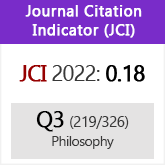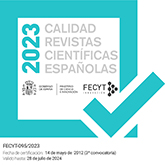Freedom as the meeting point for building trust in human relationships
DOI:
https://doi.org/10.3989/isegoria.2021.65.09Keywords:
Trust, Reliability, Rely (trust), FreedomAbstract
This paper proposes freedom as the condition of possibility for the construction of trust in human relationships. The methodology used is a review of the scientific literature of the most recent moral and political philosophy. As a result of the dialogue between different positions, it is discovered that freedom, despite being present in the act of trust, is forgotten in the discussion around trust, a forgetfulness that has as its main causes the assumption that trust is natural and the confusion between the propensity to trust and the act of trusting. All this leads to proposing an approach of the act of trusting that starts from the freedom of the trustee and the trustor.
Downloads
References
Aristóteles (1988). Política. Madrid: Gredos.
Baier, A. (1986). Trust and antitrust. Ethics, 96 (2), 231-260. https://doi.org/10.1086/292745
Baier, A. (1994). Moral Prejudices: Essays on Ethics. Cambridge: Harvard University.
Baier, A. (2010). Reflections on how we live. New York: Oxford University Press. https://doi.org/10.1093/acprof:osobl/9780199570362.001.0001
Baker, J. (1987). Trust and rationality. Pacific philosophical quarterly, 68 (1), 1-13. https://doi.org/10.1111/j.1468-0114.1987.tb00280.x
Belli, S. y Broncano, F. (2017). Trust as a MetaEmotion. Metaphilosophy, 48 (4), 430-448. https://doi.org/10.1111/meta.12255
Blanco, D. (2008). Libertad En Cortina, A. (Dir). 10 palabras clave en ética. Estella: Verbo Divino
Coeckelbergh, M. (2012). Can we trust robots? Ethics and information technology, 14 (1), 53-60. https://doi.org/10.1007/s10676-011-9279-1
Cortina, A. (1998). Hasta en un pueblo de demonios. Ética pública y sociedad. Madrid: Taurus.
Darat, N. (2021). Autonomía y vulnerabilidad. La ética del cuidado como perspectiva crítica. Isegoría, 64, e03. https://doi.org/10.3989/isegoria.2021.64.03
Domenicucci, J. y Holton, R. (2017). Trust as a Two-place Relation Oxford Scholarship. En Faulkner, P., Simpson, T. y Holton (Eds.). The Philosophy of Trust. Oxford: Oxford University Press, pp. 150-162. https://doi.org/10.1093/acprof:oso/9780198732549.003.0009
D'Cruz, J. (2015). Trust, trustworthiness, and the moral consequence of consistency. Journal of the American Philosophical Association, 1 (3), 467-484. https://doi.org/10.1017/apa.2015.3
D'Cruz, J. (2018). Trust within limits. International Journal of Philosophical Studies, 26 (2), 240-250. https://doi.org/10.1080/09672559.2018.1450080
Faulkner, P. (2007). A genealogy of trust. Episteme: A Journal of Social Epistemology, 4 (3), 305-321. https://doi.org/10.3366/E174236000700010X
Faulkner, P. (2011). Knowledge on Trust. Oxford: Oxford University Press. https://doi.org/10.1093/acprof:oso/9780199589784.001.0001
Faulkner, P. (2015). The attitude of trust is basic. Analysis, 75 (3), 424-429. https://doi.org/10.1093/analys/anv037
Faulkner, P. y Simpson, T. (Eds.) (2017). The philosophy of trust. New York: Oxford University Press. https://doi.org/10.1093/acprof:oso/9780198732549.001.0001
Fazakas, I. y Gozé, T. (2020). The Promise of the World: Towards a Transcendental History of Trust. Husserl Studies, 36 (2), 169-189. https://doi.org/10.1007/s10743-020-09264-9
Gadamer, H.-G. (1998). Verdad y método II. Salamanca: Sígueme.
Govier, T. (1992). Trust, distrust, and feminist theory. Hypatia, 7 (1), 16-33. https://doi.org/10.1111/j.1527-2001.1992.tb00695.x
Hanfling, O. (2008). How we trust one another. Philosophy, 83 (324), 161-177. https://doi.org/10.1017/S0031819108000442
Hardin, R. (1993). The street-level epistemology of trust. Politics & society, 21 (4), 505-529. https://doi.org/10.1177/0032329293021004006
Hardin, R. (2002). Trust & Trustworthiness. New York: Russell Sage Foundation.
Hawley, K. (2012). Trust: A very short introduction. Oxford: Oxford University Press. https://doi.org/10.1093/actrade/9780199697342.001.0001
Hawley, K. (2014a). Trust, distrust and commitment. Noûs, 48 (1), 1-20. https://doi.org/10.1111/nous.12000
Hawley, K. (2014b). Partiality and prejudice in trusting. Synthese, 191 (9), 2029-2045. https://doi.org/10.1007/s11229-012-0129-4
Hieronymi, P. (2008). The reasons of trust. Australasian Journal of Philosophy, 86 (2), 213-236. https://doi.org/10.1080/00048400801886496
Hinchman, E. S. (2005). Telling as inviting to trust. Philosophy and Phenomenological Research, 70 (3), 562-587. https://doi.org/10.1111/j.1933-1592.2005.tb00415.x
Hobbes, T. (2017). Leviatán. O la materia, forma y poder de una república eclesiástica y civil. México: Fondo de Cultura Económica.
Hollis, M. (1998). Trust within Reason. Cambridge: Cambridge University Press. https://doi.org/10.1017/CBO9780511612244
Holton, R. (1994). Deciding to trust, coming to believe. Australasian journal of philosophy, 72 (1), 63-76. https://doi.org/10.1080/00048409412345881
Jones, K. (1996). Trust as an affective attitude. Ethics, 107 (1), 4-25. https://doi.org/10.1086/233694
Jones, K. (1999). Second-hand moral knowledge. The Journal of Philosophy, 96 (2), 55-78. https://doi.org/10.2307/2564672
Jones, K. (2012). Trustworthiness. Ethics, 123 (1), 61-85. https://doi.org/10.1086/667838
Jones, K. (2019). Trust, distrust, and affective looping. Philosophical Studies, 176 (4), 955-968. https://doi.org/10.1007/s11098-018-1221-5
Keren, A. (2014). Trust and belief: a preemptive reasons account. Synthese, 191 (12), 2593-2615. https://doi.org/10.1007/s11229-014-0416-3
Kirton, A. (2020). Matters of Trust as Matters of Attachment Security. International Journal of Philosophical Studies, 28 (5), 583-602. https://doi.org/10.1080/09672559.2020.1802971
Küng, H. (2001). Basic trust as the foundation of a global ethic. International Review of Psychiatry, 13 (2), 94-100. https://doi.org/10.1080/09540260124822
Laniuk, Y. (2020). Freedom in the Society of Control: Ethical challenges. Ethics and Bioethics (in Central Europe), 10 (3-4), 203-220. https://doi.org/10.2478/ebce-2020-0019
Mackenzie, C. (2020). Vulnerability, Insecurity and the Pathologies of Trust and Distrust. International Journal of Philosophical Studies, 28 (5), 624-643. https://doi.org/10.1080/09672559.2020.1846985
McMyler, B. (2017). Deciding to Trust. En Faulkner, P., Simpson, T. y Holton (Eds.). The Philosophy of Trust. Oxford: Oxford University Press, 161-76. https://doi.org/10.1093/acprof:oso/9780198732549.003.0010
Nickel, P. (2007). Trust and obligation-ascription. Ethical theory and moral practice, 10 (3), 309-319. https://doi.org/10.1007/s10677-007-9069-3
Nickel, P. (2012). Trust and testimony. Pacific Philosophical Quarterly, 93 (3), 301-316. https://doi.org/10.1111/j.1468-0114.2012.01427.x
Olivier, A. (2018). The Freedom of Facticity. Religions, 9 (4), 110. https://doi.org/10.3390/rel9040110
O'Neill, O. (2002). A question of trust. Cambridge: Cambridge University Press.
O'Neill, O. (2018). Linking trust to trustworthiness. International Journal of Philosophical Studies, 26 (2), 293-300. https://doi.org/10.1080/09672559.2018.1454637
Pace, M. (2021). Trusting in order to inspire trustworthiness. Synthese, 198, 11897-11923. https://doi.org/10.1007/s11229-020-02840-8
Pettit, P. (1995). The cunning of trust. Philosophy & Public Affairs, 24 (3), 202-225. https://doi.org/10.1111/j.1088-4963.1995.tb00029.x
Plesa, P. (2021). Reassessing Existential Constructs and Subjectivity: Freedom and Authenticity in Neoliberalism. Journal of Humanistic Psychology, article in online first, https://doi.org/10.1177/00221678211032065
Potter, N. (2002). How can I be trusted?: a virtue theory of trustworthiness. Oxford: Rowman & Littlefield.
Potter, N. (2020). Interpersonal trust. En Simon, J. (Ed.). The Routledge handbook of trust and philosophy. New York: Routledge, 243-255. https://doi.org/10.4324/9781315542294-19
Robbins, B. (2016). What is trust? A multidisciplinary review, critique, and synthesis. Sociology compass, 10 (10), 972-986. https://doi.org/10.1111/soc4.12391
Ryan, M. (2020). In AI we trust: ethics, artificial intelligence, and reliability. Science and Engineering Ethics, 26 (5), 2749-2767. https://doi.org/10.1007/s11948-020-00228-y
PMid:32524425 PMCid:PMC7550313
Sartre, J. (1993). El ser y la nada. Barcelona: Altaya.
Sartre, J. (2004). El existencialismo es un humanismo. Barcelona: Edhassa.
Scheman, N. (2020). Trust and Trustworthiness. En Simon, J. (Ed.). The Routledge handbook of trust and philosophy. New York: Routledge, 28-40. https://doi.org/10.4324/9781315542294-2
Simon, J. (Ed.). (2020). The Routledge handbook of trust and philosophy. New York: Routledge. https://doi.org/10.4324/9781315542294
Simpson, T. (2012). What is trust? Pacific Philosophical Quarterly, 93 550-569. https://doi.org/10.1111/j.1468-0114.2012.01438.x
Smolkin, D. (2008). Puzzles about trust. The Southern journal of philosophy, 46 (3), 431-449. https://doi.org/10.1111/j.2041-6962.2008.tb00127.x
Spaemann, R. (2005). Confianza. Revista Empresa y Humanismo, 9 (2), 131-148.
Sztajnszrajber, D. (2018). Filosofía en 11 frases. Buenos Aires: Paidós.
Williams, B. (2002). Truth & truthfulness: An essay in genealogy. Princeton: Princeton University Press.
Wright, S. (2010). Trust and Trustworthiness. Philosophia, 38 (3), 615-627. https://doi.org/10.1007/s11406-009-9218-0
Published
How to Cite
Issue
Section
License
Copyright (c) 2021 Consejo Superior de Investigaciones Científicas (CSIC)

This work is licensed under a Creative Commons Attribution 4.0 International License.
© CSIC. Manuscripts published in both the printed and online versions of this Journal are the property of Consejo Superior de Investigaciones Científicas, and quoting this source is a requirement for any partial or full reproduction.All contents of this electronic edition, except where otherwise noted, are distributed under a “Creative Commons Attribution 4.0 International” (CC BY 4.0) License. You may read here the basic information and the legal text of the license. The indication of the CC BY 4.0 License must be expressly stated in this way when necessary.
Self-archiving in repositories, personal webpages or similar, of any version other than the published by the Editor, is not allowed.














